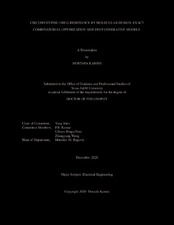| dc.description.abstract | Drug resistance is a fundamental barrier to developing robust antimicrobial and anticancer therapies. Its first sign was observed in the 1940s, soon after discovering penicillin, the first modern antibiotic. This dissertation focuses on 1) principle-driven approach for overcoming mutational resistance in single protein target through combinatorial optimization; 2) principle- and data-driven approach for alternative pathway activation in molecular networks through deep generative models.
The energy landscape theorem for protein folding is the main principle utilized for overcoming mutational resistance in a single protein target. iCFN, an exact multistate protein design, has been developed through combinatorial optimization. iCFN has been employed for real-life applications such as engineering a HER2-specific antibody-drug conjugate and unraveling the biological mechanism underlying cancerous mutations in Estrogen receptors. Building upon iCFN, an optimal drug design approach has been developed to not only predict the resistant mutations but also overcome them by designing resistant drugs.
Drug combination therapy has been one of the strategies to overcome drug resistance since at least the 1940s. Drug combinations are effective at delaying the beginning or suppressing the expansion of the resistance. However, the chemical space has been estimated to be $10^{60}$. Therefore, it is experimentally infeasible to experiment with all the compound combinations for every disease. So, a data- and principle-driven algorithm has been developed to generate drug combinations for molecular networks' desired disease. Firstly, we have developed DeepAffinity, an interpretable and accurate deep learning model for compound-protein affinity prediction. Later, it has been extended to DeepRelations, an explainable deep learning model for affinity and contact prediction. Secondly, we have designed hierarchical variation graph autoencoders (HGVAE) to jointly embed domain knowledge such as gene-gene, disease-disease, gene-disease networks. Finally, conditioning on disease representation and utilizing accurate compound-protein affinity predictor (DeepAffinity) a deep generative model has been developed through reinforcement learning and generative adversarial network to overcome resistance in molecular networks. | en |


